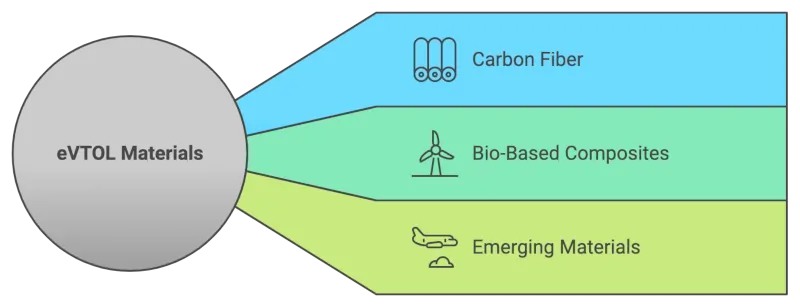The Materials Revolution: Building the Future of Flight with eVTOLs
Electric vertical takeoff and landing (eVTOL) aircraft are poised to revolutionize the way we travel, offering a new era of urban air mobility. But eVTOLs face unique challenges, particularly when it comes to weight. Every pound saved translates to longer flight times, greater efficiency, and increased range. This is where cutting-edge materials come in.

Lightweight Champions: Carbon Fiber and Advanced Alloys
Carbon fiber is the undisputed king of eVTOL materials. This remarkable material is stronger than steel yet lighter than aluminum, making it ideal for eVTOL frames, rotors, and wings. Its high strength-to-weight ratio allows for sleek, aerodynamic designs that minimize drag and maximize lift.
Advanced alloys, particularly those incorporating lithium, are also strong contenders. They offer a good balance of strength, weight, and cost, making them suitable for various eVTOL components like landing gear and structural supports.

Beyond the Structure: Batteries and Electric Motors
Batteries are the heart of any eVTOL. Their energy density directly determines the aircraft’s range and performance. Lithium-ion batteries are the current standard, but researchers are actively exploring solid-state batteries and other chemistries with the promise of even higher energy density and faster charging times.
Electric motors convert electrical energy from the battery into mechanical power to spin the rotors or propellers. Efficient motors minimize energy loss, maximize flight time, and reduce operating costs. Copper windings, rare earth magnets, and high-strength steel are essential for motor performance and durability.

Emerging Trends: Thermoplastics and Bio-based Composites
Thermoplastics are gaining traction in eVTOL manufacturing due to their lightweight, recyclability, and suitability for 3D printing. They offer the potential for lighter and more cost-effective eVTOL structures, particularly for complex shapes.
Bio-based composites are another exciting development, using natural fibers and plant-based resins to create sustainable and eco-friendly materials. As sustainability becomes increasingly important, bio-based composites offer a promising alternative to traditional composites, reducing reliance on fossil fuels and minimizing waste.

The Future of eVTOL Materials: A Lighter, Stronger, and Greener Sky
The materials used in eVTOLs are constantly evolving, driven by innovation and the relentless pursuit of efficiency, sustainability, and performance. From the established champions like carbon fiber to emerging trends like bio-based composites, these materials are paving the way for a new era of electric flight. As eVTOL technology continues to mature, we can expect even more groundbreaking materials to emerge, pushing the boundaries of what’s possible in the skies above.
Where to buy
Carbon Fiber Composites:
- Manufacturers: Start with the big names in advanced composites:
- Toray Advanced Composites: They have a whole section on their website dedicated to Urban Air Mobility (which includes eVTOLs).
- Hexcel: Another major player in aerospace composites.
- Distributors: Companies like Solvay and Mitsubishi Chemical Advanced Materials distribute a wide range of composite materials.
- Smaller Specialized Suppliers: Depending on your needs, you might find what you’re looking for from companies like ACP Composites or Rock West Composites.
For Advanced Alloys:
- Metal Suppliers: Look for companies that specialize in aerospace-grade aluminum and titanium alloys:
- Alcoa: A giant in the aluminum industry.
- ATI Metals: Focuses on specialty metals like titanium and nickel alloys.
- Constellium: Supplies aluminum solutions to various industries, including aerospace.
For Batteries:
- Battery Cell Manufacturers: The big names in lithium-ion batteries are a good starting point:
- LG Energy Solution
- CATL
- Panasonic
- Samsung SDI
- For solid-state batteries: This is a newer technology, so the suppliers are more specialized. Keep an eye on companies like QuantumScape and Solid Power.
Electric Motors:
- Motor Manufacturers: Many companies specialize in electric motors for aerospace applications:
- MagniX: Focuses on electric propulsion for aircraft.
- Siemens: A major player in industrial electric motors, including those used in aviation.
- Rolls-Royce: Yes, the luxury car maker is also developing electric aircraft propulsion systems.
This blog post has provided a brief overview of the key materials used in eVTOLs and DIY kits.
I hope it has given you a better understanding of the critical role these materials play in shaping the future of urban air mobility.

